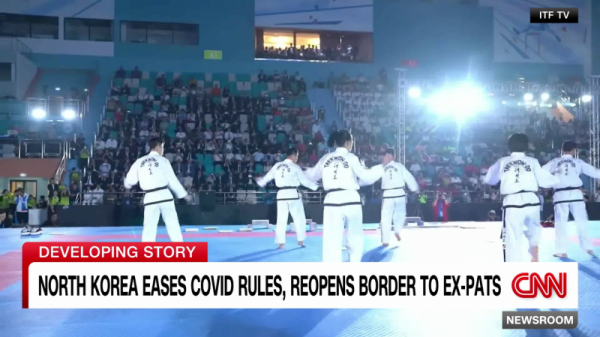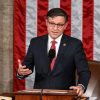NEW YORK — President Biden on Wednesday invited Prime Minister Benjamin Netanyahu to Washington before the end of the year, granting the Israeli leader a visit he has coveted even as the president reiterated his concerns about Netanyahu’s changes to Israel’s judicial system.
The discussion between the two leaders, held on the sidelines of the U.N. General Assembly, came amid mass protests in Israel over the government’s plans to remake the judiciary as well as near-nightly West Bank military raids that have made this the deadliest year for Palestinians in decades.
Biden, who has been a staunch supporter of Israel throughout his career, has previously warned Netanyahu about his effort to weaken his nation’s judiciary, a move that has been widely criticized as undemocratic. Despite their decades of familiarity, the two have had a frosty relationship since Netanyahu returned to power last November at the head of a far-right coalition, and Wednesday’s bilateral marked the first face-to-face meeting since then.
The president, in comments at the start the meeting, made it clear his concerns have not diminished.
“We’re going to discuss some of the hard issues — that is, upholding democratic values that lie at the heart of our partnership, including the checks and balances in our systems, and preserving the path to a negotiated two-state solution,” Biden said. He also said the discussion would include a subject where the two leaders are more aligned: “ensuring that Iran never, never acquires a nuclear weapon.”
In their closed-door session, Biden urged Netanyahu to take “immediate measures to improve the security and economic situation” in the West Bank, according to a White House readout. The president also discussed the goal of normalizing relations between Israel and other Middle Eastern nations and welcomed the deepening U.S.-Israeli collaboration on technology, the White House said.
“Even where we have some differences, my commitment to Israel, you know, is ironclad,” Biden said before the meeting. “I think without Israel, there’s not a Jew in the world who is secure. Israel is essential.”
Netanyahu, who is now in his record sixth term, had signaled clearly that he wanted an official invite to the White House this year, and some Israelis saw Biden’s decision to hold their first in-person meeting in New York instead of Washington as a pointed snub.
If Biden had not extended the invitation, Netanyahu would have been the first Israeli premier not to visit the White House in the first year of his term, going back to Golda Meir’s state dinner with Richard M. Nixon in 1969. (At the start of his second term, Yitzhak Rabin met President George H.W. Bush at his summer retreat in Kennebunkport.)
“I hope we will see each other in Washington by the end of the year,” Netanyahu told Biden in his opening remarks.
The formal invitation from Biden is a victory for Netanyahu, who will be able to return to Jerusalem with evidence that relations remain strong with the United States, Israel’s most important ally. It also suggests a soothing of tensions between the two leaders, though U.S. officials made clear that Biden did not hold back his criticism of Israel’s recent actions in its government or in the West Bank.
Netanyahu sought to respond to the widespread criticism, in Israel and abroad, that his efforts to weaken his country’s judicial system are a blow against Israel’s democracy and its system of checks and balances.
“I want to reassert here before you, Mr. President, that one thing is certain, and one thing will never change, and that is Israel’s commitment to democracy,” Netanyahu said. “We will continue to uphold the values that both our proud democracies cherish.”
The two leaders also discussed ongoing efforts, led by the United States, to normalize relations between Israel and Saudi Arabia, which has never formally recognized Israel. A path toward normalization would probably include the United States giving Saudi Arabia greater security guarantees and Israel making some concessions on the issue of Palestinian statehood.
“If you and I, 10 years ago, were talking about normalization with Saudi Arabia, I think we’d look at each other like, ‘Who’s been drinking what?’ ” Biden said at the start of the meeting.
Part of the challenge for U.S. officials is that Netanyahu is constrained by the far-right coalition he assembled to form a government after the last election, which includes fiery nationalist and religious figures. Biden has called the coalition “one of the most extremist” in Israel’s history.
“Such a peace would go a long way first to advance the end of the Arab-Israeli conflict, achieve reconciliation between the Islamic world and the Jewish state, and advance a genuine peace between Israel and the Palestinians,” Netanyahu said at the start of the meeting. “This is something within our reach.”
A senior administration official, speaking on the condition of anonymity to discuss a private meeting, told reporters that the move toward Israeli-Saudi normalization has been progressing, but that “nobody has ever said this is right around the corner.” The official added that all leaders involved in the talks have acknowledged any normalization deal would hinge in part on what concessions Israel makes to address the status of Palestinians.
Jeremy Ben-Ami, the president of J Street, a liberal, pro-Israel advocacy group, said he wished Biden had delivered a firmer message to Netanyahu about the judicial overhaul and urged him to end all the proposed changes that opponents say would undercut Israeli democracy by reducing the courts’ ability to rule on fundamental issues.
Massive street protests have rocked Israel for months over the proposals, and the country’s Supreme Court recently heard arguments over whether they are permissible.
“An invitation to come to Washington later in the year wasn’t necessarily needed today,” Ben-Ami said. “It could have waited to see what the next developments are. A stronger, clearer message from the president to the prime minister that this route needs to change before an invitation is forthcoming would have been our preferred course.”
He added: “One can only hope that behind closed doors, the messages were delivered with more force and more clearly.”
After meeting with Netanyahu, Biden held a meeting with Brazilian President Luiz Inácio Lula da Silva, and the two leaders then announced a new partnership focused on workers’ rights at an event with labor leaders. The efforts are meant to advance goals including ending worker exploitation and workplace discrimination, U.S. officials said.
Although the United States hopes to eventually expand the initiative to other countries, officials said the Biden administration chose Brazil first because it could serve as a bridge to other nations.
“The two largest democracies in the Western Hemisphere are standing up for human rights around the world and in the hemisphere,” Biden said ahead of his meeting with Lula. “That includes workers’ rights.”
The focus on labor comes amid strikes across the United States, including work stoppages by writers and actors in Hollywood and by autoworkers in the Midwest. Biden wore a red tie Wednesday in solidarity with striking autoworkers, White House officials said.
“Whether it’s the autoworkers or any other union worker, record corporation profits should mean record contracts for union workers,” the president said at the labor event.
The United Auto Workers on Tuesday threatened to expand its historic strike against Detroit’s Big Three automakers Friday unless “serious progress” is made toward an agreement.
Biden concluded his four-day trip to New York with two fundraisers for his reelection campaign. The president appeared at four such events during the trip and will continue raising money next week in San Francisco during a West Coast swing.
Biden’s campaign is looking to fill its coffers before a Sept. 30 deadline, when the president’s team, along with those of his would-be Republican challengers, will have to report their total haul over the past three months.
Steve Hendrix in Jerusalem and Marisa Iati in Washington contributed to this report.







































